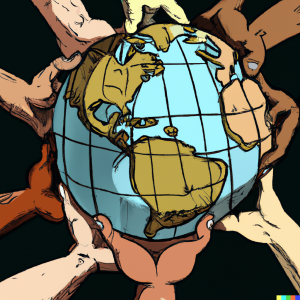
What Happens When a Crisis Shuts Down Witnesses?
When the world shut down in March 2020, something unexpected happened. Calls to the UK’s anti-trafficking helpline didn’t stop—but who was calling changed dramatically.
Public reports of suspicious activity fell off a cliff. But self-reports by victims of exploitation? They surged—rising from 7% to 25% in labor cases alone. This dramatic shift reveals not just how trafficking patterns changed during the pandemic—but how our entire system of witnessing, reporting, and helping was upended.
A new study from University College London offers one of the most detailed looks yet at how crises reshape help-seeking behavior in human trafficking. And it has major implications for how we prepare for the next disaster.
The Hidden Pulse of a Pandemic: A Helpline’s Frontline View
The UK’s Modern Slavery & Exploitation Helpline is a lifeline for people trapped in forced labor, sexual exploitation, criminal servitude, and domestic slavery. Run 24/7 by the nonprofit Unseen, it handles thousands of cases a year—often from people too afraid or unable to reach law enforcement.
Researchers analyzed over 8,000 cases from 2016 to 2021 to uncover how calls changed before and after COVID-19 lockdowns. The question wasn’t just how many people called—but who called, and why.
The results tell a story of risk, resilience, and a system under pressure.
Who Spoke Up—and Who Fell Silent
The biggest surprise? Total case numbers stayed about the same during the pandemic. But that hides a deeper shift:
- Self-reports from victims increased across nearly every category.
- Public reports of suspicious activity dropped sharply—and didn’t bounce back after lockdowns lifted.
- Labor exploitation reports declined in shuttered industries like hospitality—but surged in essential sectors like farms and factories.
- Sexual and criminal exploitation reports shifted in unpredictable ways, complicating early pandemic predictions.
This wasn’t just a temporary blip. Public tip-offs about suspicious activity are still far below pre-pandemic levels, suggesting something more lasting may have changed in public awareness—or willingness to report.
Why Did Victims Start Reaching Out More?
Lockdowns made already dangerous jobs even worse. People exploited in essential sectors—agriculture, construction, manufacturing—were often forced to keep working in unsafe, unsanitary conditions. Without access to in-person support services, the Helpline became one of the few available resources.
And so, for the first time, many people being exploited spoke for themselves.
That’s both heartening and sobering. On one hand, it means more people found their voice. On the other, it raises hard questions: Why weren’t they calling before? What was stopping them—and what still is?
Why Did the Public Stop Reporting?
Before the pandemic, community members made up a significant portion of Helpline contacts. People noticed something suspicious—a locked garage, a distressed teenager, strange activity at a nail salon—and made a call.
But once people were ordered to stay home, that all changed. Even after restrictions lifted, those calls didn’t come back. Some possible reasons?
- Less exposure to suspicious situations.
- Public preoccupation with their own health and finances.
- Fatigue from years of “spot the signs” messaging that may have lost public trust.
- Fear of being wrong—or making things worse.
This trend isn’t just about volume. It’s about the sustainability of public involvement in anti-trafficking efforts—and whether we’ve relied too heavily on community policing models that are fragile in times of crisis.
From Car Washes to Cannabis Farms: Shifting Exploitation Patterns
The types of exploitation also changed.
- Criminal exploitation, especially related to drug trafficking, rose. Some exploiters moved children into more visible roles, like street distribution, as police cracked down harder.
- Sexual exploitation didn’t decline as expected, despite the shutdown of face-to-face services. Victims may have been pushed into even riskier or less visible situations.
- Domestic servitude cases didn’t spike during lockdowns, but self-reports in this category grew, showing it may have simply gone deeper underground.
The helpline’s data show that traffickers adapted quickly to new restrictions—faster, perhaps, than service providers or law enforcement could.
What Can We Learn for the Next Crisis?
Helplines are uniquely positioned to remain open when other services shut down. But that doesn’t mean they’re fully prepared.
The study’s authors stress that helplines need:
- More funding and staff during emergencies.
- Better integration with referral services like housing, healthcare, and legal aid.
- Data-sharing strategies to spot emerging trends faster.
- Community education that actually empowers people to report what they see—even when it’s complicated.
They also call for more qualitative research: We need to hear from victims and survivors directly to understand what drove them to seek help—and what still stands in the way for others.
The Bigger Picture: Trafficking Is a Public Health Issue
Too often, trafficking is seen solely as a criminal justice problem. But as this study shows, it’s also a deeply embedded public health challenge—one that touches housing, labor rights, mental health, and migration.
In times of crisis, these vulnerabilities don’t pause. They multiply.
By treating trafficking as a health issue, we can focus on prevention, harm reduction, and systemic change—rather than just catching bad guys after the fact.
Join the Conversation
What does this shift in helpline data tell us about the public’s role in fighting exploitation?
How might your community prepare to support survivors if another crisis hit tomorrow?
And what would it take to truly center survivors—not just in services, but in solutions?
Let us know in the comments or on social media.
Act Now – Public Health Can’t Wait!
The future of public health is being shaped right now. Stay informed with weekly expert insights and take action where it matters most. Subscribe for free today!
📢 Time is critical! Share this blog now and rally others to join the movement.



